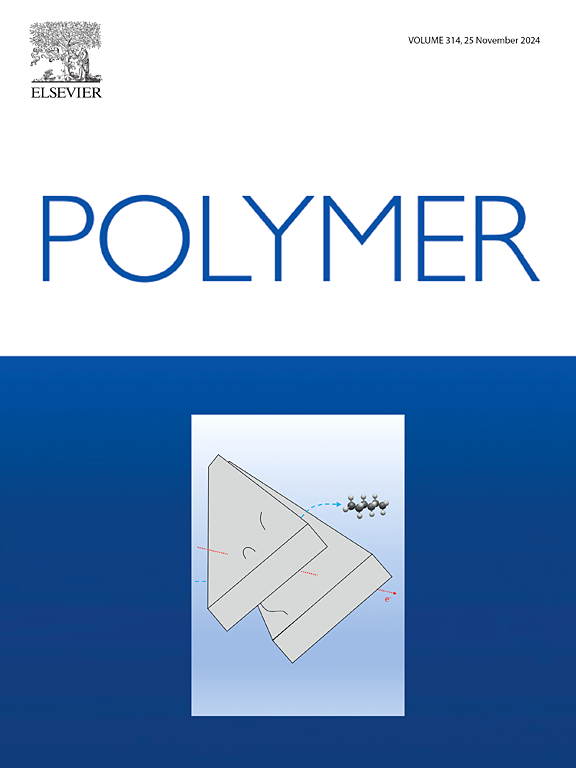离子液体催化混合塑料的甲醇水解:PET解聚及PP/PE的回收
IF 4.1
2区 化学
Q2 POLYMER SCIENCE
引用次数: 0
摘要
在复合材料的背景下,通过传统的预处理方法,如粉碎、造粒和浮选,难以分类——特别是在食品包装、建筑材料和工程塑料领域——本研究采用一步甲醇分解分离技术,对混合塑料中的聚丙烯(PP)、聚乙烯(PE)和聚对苯二甲酸乙二醇酯(PET)进行分级回收。以甲醇为反应溶剂,采用良性环保离子液体BMIMOH作为催化剂对PET进行降解。PET甲醇化生成对苯二甲酸二甲酯(DMT),而PP和PE保持高度稳定,反应后分离,并进行后续回收。通过结构和热力学分析揭示了聚丙烯和聚乙烯在甲醇解条件下的稳定性。采用单因素分析和响应面法确定了甲醇分解反应的最佳条件。此外,还探讨了高温胀缩过程中不同PP和PE含量对混合塑料中PET回收率的影响。在最佳条件下,降解单个PET的DMT收率为94%,当混合塑料中PET的比例为50%时,DMT收率仍可达到90%。本文章由计算机程序翻译,如有差异,请以英文原文为准。

Methanolysis of mixed plastics catalyzed by ionic liquid: PET depolymerization and recycling of PP/PE
In the context of composite materials that elude classification via conventional pretreatment methodologies such as crushing, granulating, and flotation—specifically within the domains of food packaging, construction materials, and engineering plastics—this research employed a one-step methanolysis-separation technique for the graded recycling of polypropylene (PP), polyethylene (PE), and polyethylene terephthalate (PET) in mixed plastics. Employing methanol as the reaction solvent, the benign and eco-friendly ionic liquid BMIMOH as the catalyst for the degradation of PET. PET was methanolized to produce dimethyl terephthalate (DMT), while PP and PE remained highly stable, were separated after the reaction, and subjected to subsequent recycling. The stability of PP and PE under methanolysis conditions was revealed through structural and thermodynamic analyses. Single-factor analysis and response surface methodology were employed to determine the optimal conditions for the methanolysis reaction. Additionally, the impact of different contents of PP and PE on the recovery of PET from the mixed plastics during the swelling-condensation process at high temperatures was explored. Under the optimal conditions, the yield of DMT was 94 % for the degradation of single PET, and when the ratio of PET in the mixed plastics was 50 %, the yield of DMT could still reach 90 %.
求助全文
通过发布文献求助,成功后即可免费获取论文全文。
去求助
来源期刊

Polymer
化学-高分子科学
CiteScore
7.90
自引率
8.70%
发文量
959
审稿时长
32 days
期刊介绍:
Polymer is an interdisciplinary journal dedicated to publishing innovative and significant advances in Polymer Physics, Chemistry and Technology. We welcome submissions on polymer hybrids, nanocomposites, characterisation and self-assembly. Polymer also publishes work on the technological application of polymers in energy and optoelectronics.
The main scope is covered but not limited to the following core areas:
Polymer Materials
Nanocomposites and hybrid nanomaterials
Polymer blends, films, fibres, networks and porous materials
Physical Characterization
Characterisation, modelling and simulation* of molecular and materials properties in bulk, solution, and thin films
Polymer Engineering
Advanced multiscale processing methods
Polymer Synthesis, Modification and Self-assembly
Including designer polymer architectures, mechanisms and kinetics, and supramolecular polymerization
Technological Applications
Polymers for energy generation and storage
Polymer membranes for separation technology
Polymers for opto- and microelectronics.
 求助内容:
求助内容: 应助结果提醒方式:
应助结果提醒方式:


